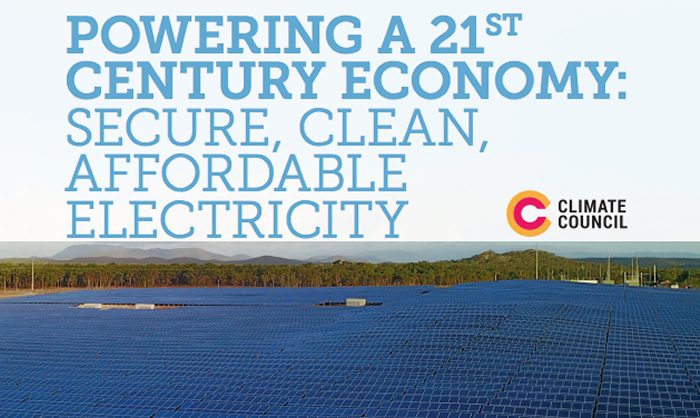Australia’s transition to a grid powered by renewable energy and supported by storage is only being held back by ongoing climate and energy policy deadlock states a new Climate Council report.
The report says there are no technical barriers to Australia achieving a secure, economical and reliable supply of electricity from a high level of renewables. This isn’t just the opinion of the Council, but also of CSIRO, AEMO, the Finkel Review and other authorities.
The direction of Australia’s energy future is becoming increasingly pressing, partly due to the fact that within a decade, a majority of coal-fired power generators in the National Electricity Market will be at least half a century old – and really showing their age.
An example of this is Liddell Power Station. Although a significant amount of money has been thrown at it, the facility failed during a heatwave in February this year. Liddell owners AGL recently stated they were fighting a losing battle in keeping the clunker cranking, yet the Federal Government wants it continue operations.
“You wouldn’t try and salvage a broken down, 50 year old clunker of a car – so why is our government attempting to do the same with old coal fired power stations?,” said Climate Councillor Andrew Stock.
A recent survey carried out on behalf of the Council found 77% of Australians believe public money should not be used to keep Liddell Power Station gasping past 2022, its intended closure date.
Inevitable coal closures provide a critical opportunity to modernise Australia’s electricity system with more sustainable solutions says the Council, but politicians digging in their heels in favour of fossil fuels is hampering the process.
“So much energy is wasted debating issues of yesteryear while the rest of the world has moved on,” said Mr. Stock. “It’s time for the Federal Government to stop playing politics and start moving on our renewables future, not the solutions of the past.”
‘Powering a 21st Century Economy: secure, clean, affordable electricity,’ can be downloaded here (PDF).
Poll : Majority Of Australians Think A CET Is Important
Results from another recent poll released by the Climate Council indicate 77% of Australians recognise the importance of a Clean Energy Target (CET). Majority support is across the political spectrum, including among 61% of Liberal voters who believe CET is important.
“The public opinion is very clear – renewable energy technologies are the most affordable, reliable, way to power our 21st century economy. Every day that national action is delayed is a day wasted,” said Climate Council CEO Amanda McKenzie.
The survey of 2,176 residents across Australia was conducted on 20th September 2017 by ReachTEL on behalf of the Climate Council. Further details can be viewed here.


 RSS - Posts
RSS - Posts



Start writing to your members of parliament. I have sent a letter to Turnbull as well as my federal member. My federal member had an online form I could fill out stating what issues were important to me. Maybe yours does too. With enough voices bombarding the government maybe something will be done.
I just don’t understand why the government doesn’t see the benefits of renewables. Even if you don’t subscribe to global warming how about all the other benefits?
– Most renewables don’t use huge amounts of fresh water like Coal, Nuclear, Gas.
– Energy security. E.g. If our transport system is electric we no longer need to rely on the unstable Middle East for oil.
– Australia’s balance of trade is better because we won’t need to import oil
– If less oil is being transported around the world there is less chance of environmental disasters from oil spills
– Less particulates in the air
– Less carbon in the atmosphere
– Less breathing related health issues
– Less soot all over city buildings (which requires maintenance) I remember seeing in Paris the old stone buildings needing constant maintenance due to car pollution. I believe when the rain mixed with the soot it became quite acidic.
– No feedstock required (e.g. coal, uranium, gas)
– We have our very own essentially inexhaustible fusion reactor in the sky – our local star. We just need to harness a small part of the energy from it.
– Job creation
– Stable (even decreasing) energy prices. Cheap energy essential for manufacturing.
– Can be built on otherwise unusable land. E.g. A desert is perfect for solar.
– Little chance of environmental disaster like nuclear meltdown or coal storage spontaneous combustion.
– No requirement to store waste products. E.g. radioactive materials
– Many resources required to build renewables are abundant and recyclable
– If you have an excess of renewables you can then potentially use the excess to create a hydrogen industry through electrolysis. Perhaps Australia could become a leader in hydrogen given we have such abundant renewable sources of energy. You only need to fire up the electrolysis stations to absorb excess electricity.
I am sure other readers will come up with more.
Case in point regarding energy security. Fuel and oil in particular:
http://www.msn.com/en-au/money/news/australia-needs-electric-vehicles-more-than-any-other-nation/ar-AAsXXVy?li=AA54Gb&ocid=spartandhp
Thank you for sharing this, it is spot on. Our vulnerability to even a slow down of oil imports is well understood. Not sure that the dots have been connected in this way before.
Shame about ideology of the current coal – ition parties…..